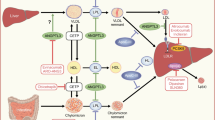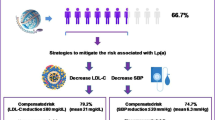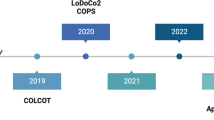Abstract
Objective
There is a large population of patients classified as complex higher-risk and indicated patients (CHIPs) in China with a poor prognosis. The treatment of these patients is complex and challenging, especially when acute cardiac events occur, such as acute coronary syndrome (ACS) or heart failure. Pharmacotherapy and some mechanical circulatory support (MCS) therapeutic devices can provide stable hemodynamic support for CHIPs-percutaneous coronary intervention (PCI). LDL-C is an important pathogenic factor in atherosclerosis, and the target of blood lipid control. Recent studies have revealed that lipoprotein(a) [Lp(a)], which is formed when a covalent bond between apolipoprotein(a) and apolipoprotein B-100 is made, produces an LDL-like particle. This particle is an independent risk factor for the development of atherosclerosis, and is closely correlated to stent thrombosis and restenosis. Furthermore, this requires active intervention. PCSK9 inhibitors have been used in lipid-lowering treatment, and preventing atherosclerosis. The present study explores the efficacy of PCSK9 inhibitors in CHIPs-ACS, and the association between the change in Lp(a) and survival after 2 years of follow-up.
Methods
The present real-world, prospective control study enrolled 321 CHIPs-ACS who underwent emergency PCI from August 2019 to November 2020, and these patients were followed up for 2 years. These patients were divided into two groups: PCSK9 group (n=161) given the combined PCSK9 inhibitor (140 mg of evolocumab every 2 weeks) and statins-based therapy, and SOC group (n=160) treated with statin-based lipid-lowering therapy alone. Then, the change in lipid index was measured, and the cardiovascular (CV) event recurrence rate was evaluated after one month and 2 years. Afterwards, the contribution of serum lipid parameters, especially the Lp(a) alteration, in patients with earlier initiation of the PCSK9 inhibitor to the CV outcome was analyzed.
Results
The LDL-C level was significantly reduced in both groups: 52.3% in the PCSK9 group and 32.3% (P<0.001) in the SOC group. It is noteworthy that the Lp(a) level decreased by 13.2% in the PCSK9 group, but increased by 30.3% in the SOC group (P<0.001). Furthermore, the number of CV events was not significantly different between the PCSK9 and SOC groups after the 2-year follow-up period. In the PCSK9 group, the Lp(a) reduction was associated with the baseline Lp(a) levels of the patients (r2 =−0.315, P<0.001). Moreover, the decrease in Lp(a) contributed to the decline in CV events in patients who received ACS CHIPs-PCI, and the decrease in Lp(a) level was independent of the LDL-C level reduction.
Conclusion
The early initiation of PCSK9 inhibitors can significantly reduce the LDL-C and Lp(a) levels in ACS CHIPs-PCI. However, further studies are needed to confirm whether PCSK9 inhibitors can reduce the incidence of CV disease in CHIPs.
Similar content being viewed by others
References
Valk F, Bekkering S, Kroon J, et al. Oxidized Phospholipids on Lipoprotein(a) Elicit Arterial Wall Inflammation and an Inflammatory Monocyte Response in Humans. Circulation, 2016,134(8):611–624
Nordestgaard BG, John CM, Kausik R, et al. Lipoprotein(a) as a cardiovascular risk factor: current status. Eur Heart J, 2010,31(23):2844–2853
Peden JF, Hopewell J, Clarke R. Genetic variants associated with Lp(a) lipoprotein level and coronary disease. N Engl J Med, 2009,361(26):2518–2528
Kamstrup, Pia R, Tybærg-Hansen, et al. Genetically Elevated Lipoprotein(a) and Increased Risk of Myocardial Infarction. JAMA, 2009,301:2331–2339
Patti G, Pasceri V, Colonna G, et al. Atorvastatin pretreatment improves outcomes in patients with acute coronary syndromes undergoing early percutaneous coronary intervention: results of the ARMYDA-ACS randomized trial. J Am Coll Cardiol, 2007,49(12):1272–1278
Zheng B, Jiang J, Liu H, et al. Efficacy and safety of serial atorvastatin load in Chinese patients undergoing elective percutaneous coronary intervention: results of the ISCAP. Eur Heart J Suppl, 2015(suppl_B):B47–B56
Jang Y, Zhu J, Ge J, et al. Preloading with atorvastatin before percutaneous coronary intervention in statin-naïve Asian patients with non-ST elevation acute coronary syndromes: A randomized study. J Cardiol, 2014,63(5):335–343
Berwanger O, Santucci EV, de Barros E Silva PGM, et al. Effect of Loading Dose of Atorvastatin Prior to Planned Percutaneous Coronary Intervention on Major Adverse Cardiovascular Events in Acute Coronary Syndrome: The SECURE-PCI Randomized Clinical Trial. JAMA, 2018,319(13):1331–1340
Zheng W, Zhang YJ, Bu XT, et al. LDL-cholesterol goal attainment under persistent lipid-lowering therapy in northeast China: Subgroup analysis of the dyslipidemia international study of China (DYSIS-China). Medicine (Baltimore), 201,96(46):e8555
François M, Colin B, Catapano AL, et al. 2019 ESC/EAS Guidelines for the management of dyslipidaemias: Lipid modification to reduce cardiovascular risk. Eur Heart J, 2019(1):1
Chinese expert consensus on lipid management of very high-risk atherosclerotic cardiovascular disease patients. Chin J Cardiol (Chinese), 2020,48(4):280–286
China cholesterol education program (CCEP) expert advice for the management of dyslipidaemias to reduce cardiovascular risk (2019). Chin J Intern Med (Chinese), 2019,59(1):18–22
Yongjun W, Chunxue W, Zhongrong M. Chinese guidelines for secondary prevention of ischemic stroke and transient ischemic attack 2014. Chin J Neurol (Chinese), 2015,48(04):258–273
Blom DJ, Hala T, Bolognese M. A 52-week placebo-controlled trial of evolocumab in hyperlipidemia. N Engl J Med, 2014,370:1809–1819
Kck A, Sw A, Gp B, et al. Evolocumab for Early Reduction of LDLCholesterol Levels in Patients With Acute Coronary Syndromes (EVOPACS). J Am Coll Cardiol, 2019,74(20):2452–2462
Leucker TM, Blaha MJ, Jones SR, et al. Effect of Evolocumab on Atherogenic Lipoproteins During the Peri- and Early Postinfarction Period: A Placebo-Controlled, Randomized Trial. Circulation, 2020,142:419–421
Mjk A, Mss B, Rpgs B, et al. Long-Term Efficacy and Safety of Evolocumab in Patients With Hypercholesterolemia. J Am Coll Cardiol, 2019,74(17):2132–2146
Liu YQ, Li DD, Chai M, et al. Real world effectiveness of PCSK-9 inhibitors combined with statins versus statins-based therapy among patients with very high risk of atherosclerotic cardiovascular disease in China (RWE-PCSK study). J Gerratr Cardiol, 2021,18(4):261–270
O’Donoghue ML, Fazio S, Giugliano RP, et al. Lipoprotein(a), PCSK9 Inhibition, and Cardiovascular Risk Insights From the FOURIER Trial. Circulation, 2019,139:1483–1492
Duarte Lau F, Giugliano RP. Lipoprotein(a) and its Significance in Cardiovascular Disease: A Review. JAMA Cardiol, 2022,7(7):760–769
Enkhmaa B, Anuurad E, Zhang W, et al. The roles of apo(a) size, phenotype, and dominance pattern in PCSK9-inhibition-induced reduction in Lp(a) with alirocumab. J Lipid Res, 2017,58(10):2008–2016
Tsimikas S, Philip L, Gordts SM, et al. Statin therapy increases lipoprotein(a) levels. Eur Heart J, 2020,41(24):2275–2284
Watts GF, Chan DC, Dent R, et al. Factorial effects of evolocumab and atorvastatin on lipoprotein metabolism. Circulation, 2017,135(4):338–351
Watts GF, Chan DC, Somaratne R, et al. Controlled study of the effect of proprotein convertase subtilisin-kexin type 9 inhibition with evolocumab on lipoprotein(a) particle kinetics. Eur Heart J, 2018,39(27):2577–2585
Sharma M, Redpath GM, Williams MJA, et al. Recycling of Apolipoprotein(a) after PlgRKT-Mediated endocytosis of lipoprotein(a). Circ Res, 2017,120(7):1091–1102
Author information
Authors and Affiliations
Corresponding authors
Ethics declarations
The authors declare that they have no conflicts of interest in this work.
Additional information
This study was supported by grants from the Translational Medicine and Interdisciplinary Research Joint Fund of Zhongnan Hospital of Wuhan University (No. ZNLH-201907), the Hubei Province Health and Family Planning Scientific Research Project (No. WJ2019Q041), and the Chinese Academy of Medical Science Innovation Fund for Medical Sciences (No. 2021-I2M-1-009).
Rights and permissions
About this article
Cite this article
Jin, Zl., He, T., Peng, L. et al. Lipoprotein(a) and Benefit of PCSK9 Inhibition in Emergency Complex Higher-risk and Indicated Patients. CURR MED SCI 43, 1206–1212 (2023). https://doi.org/10.1007/s11596-023-2791-9
Received:
Accepted:
Published:
Issue Date:
DOI: https://doi.org/10.1007/s11596-023-2791-9




